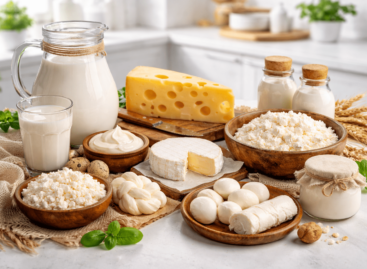Hungarian winemakers can count on government support in the future as well
Zsolt Feldman, State Secretary of the Ministry of Agriculture responsible for agriculture and rural development, gave a presentation on the state of the grape and wine industry, the new wine law rules and agricultural support applications for winegrowers and winemakers at Soltvadkert, XIV. At an event organized on the occasion of the Martin’s Day new wine holiday.

(Photo: Pixabay)
According to the state secretary’s information, 2.8-2.9 million hectoliters of wine can be produced from the estimated 4.1 million máza grape harvest this year, of which nearly 1.4 million hectoliters will be produced in the Kunság wine region. For this reason, farmers in the wine region harvested 19,400 hectares this year, harvesting more than 1.9 million grapes. Zsolt Feldman reminded: In the EU this year, too, the yield remained below the 5-year average, from which 165 million hectoliters of wine is expected to be produced.
New regulations are coming into effect regarding wine distribution
Zsolt Feldman spoke about the fact that – due to the partial EU extension of the rules on food labeling to wines – it will be mandatory for the wine products produced after December 7, 2023, on the label and electronic marking, on a related website accessible to consumers, to indicate the nutritional value of the wines, the the indication of allergens and ingredients. This is a task for winemakers, but the Ministry of Agriculture, together with the National Council of Mountain Communities and the National Food Chain Safety Office, provides assistance in solving them. He reported that this summer there were several changes in domestic regulations that favorably affected winemakers, from new administrative simplifications in the form of excise duties to the possibility of making partially alcohol-free wines. Zsolt Feldman stated that the amendment to the Excise Act will enable wine producers to produce and distribute small-scale wine distillate. The state secretary spoke about extended producer responsibility, in the framework of which winemakers also have to pay a fee to reimburse the costs related to the waste treatment of their products. In view of the special situation of the sector, compared to what was originally determined, it became possible for wineries to pay a simplified flat fee, the amount of which is also adjusted to the level of the product fee paid so far. In order to increase the sale of quality wines, it is a further relief for domestic wine market players that, in order to increase the sale of quality wines, based on the government’s decision, companies are exempted from paying the representation tax for protected origin wine products purchased for business representation and as business gifts, if the product is directly sold by the producer they buy it from wineries, and this has a stimulating effect on the demand for quality domestic wines.
The sector can still count on government support
According to the plans, the subsidy application for the modernization of domestic vineyards can be submitted between December 11 and January 8, and a budget of 71.1 million euros is available for this purpose until 2027. In the spring of the following year, the next round of support for the purchase of winemaking machinery and technological equipment will start, and a budget of 21 million euros has been set for the following years. There is no alternative to cooperation – stated the state secretary, which is why they created the producer integration organizational model based on the experiences of grape growers, which as a very simple form of institutionalized production and sales cooperation now enables the joint sale of such a production volume, even on a mountain commune organizational base, with which they can already proceed effectively up in market bargaining processes. Unfortunately, there is currently a low willingness to cooperate between winegrowers and winemakers, even though they depend on each other in a lot of things, from variety selection to product quality. Zsolt Feldman touched on the fact that at the beginning of next year, the announcement of new agricultural and rural development tenders and grant titles will start, for which almost HUF 2,900 billion will be available to farmers. In March, the first tender package aimed at the implementation of agricultural and food industry investments may be published, which already includes the modernization of wineries and the planting of plantations among the calls that directly support viticulture and winemaking. Announcements of calls for generational change are expected in the summer, followed by rural development tender schemes for small settlements and farms in the fall. By the end of next year, a new investment tender package is expected to be announced, which will provide assistance to grape growers in the mechanization of plantations.
AM
Related news
The buyer wants predictability: this is why foreign wines are gaining ground on the domestic market
🎧 Hallgasd a cikket: Lejátszás Szünet Folytatás Leállítás Nyelv: Auto…
Read more >NAK President: more than 120 thousand people signed the agricultural petition in one month
🎧 Hallgasd a cikket: Lejátszás Szünet Folytatás Leállítás Nyelv: Auto…
Read more >Milk and dairy product prices decreased at the beginning of the year in Hungary
🎧 Hallgasd a cikket: Lejátszás Szünet Folytatás Leállítás Nyelv: Auto…
Read more >Related news
MOHU: 5,200 return points are in operation, but 47 larger settlements still do not have RE points – public “enema” machines may be introduced
🎧 Hallgasd a cikket: Lejátszás Szünet Folytatás Leállítás Nyelv: Auto…
Read more >GDP growth in OECD member countries slowed to 0.3 percent in the last quarter of last year
🎧 Hallgasd a cikket: Lejátszás Szünet Folytatás Leállítás Nyelv: Auto…
Read more >KSH: in the fourth quarter of last year, investment performance was 1.3 percent lower than a year earlier
🎧 Hallgasd a cikket: Lejátszás Szünet Folytatás Leállítás Nyelv: Auto…
Read more >







